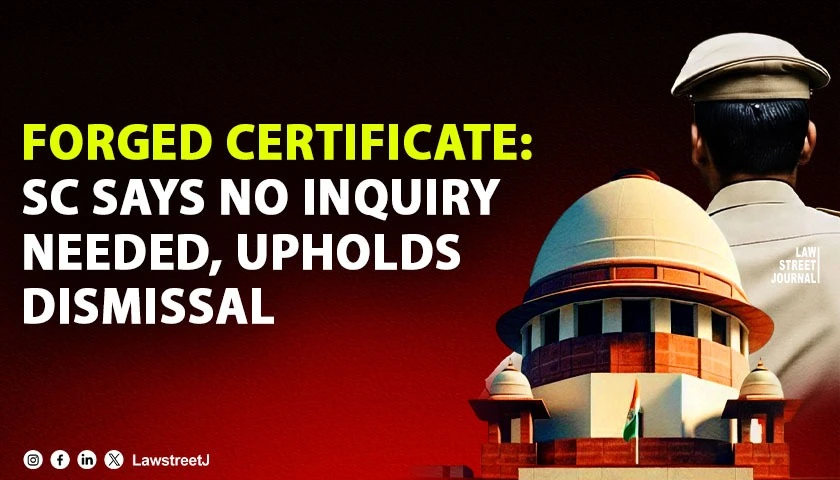New Delhi: The Supreme Court has upheld the dismissal of a Delhi Police constable whose initial appointment was secured on the strength of a forged educational certificate, holding that such misconduct strikes at the heart of public service discipline and does not require a full-fledged departmental inquiry to validate the penalty.
The Bench of Justices Ahsanuddin Amanullah and Prashant Kumar Mishra restored the original dismissal order after setting aside the decisions of the Central Administrative Tribunal and the Delhi High Court, both of which had directed a fresh inquiry.
The respondent had been appointed as a constable in 1988. In 1996, a complaint surfaced alleging that the mark sheet and degree he had submitted at the time of recruitment were fabricated. Upon verification by the issuing authority, the certificate was confirmed to be forged. The department proceeded to dismiss him from service through an order dated 4 February 1997 without holding a full inquiry, considering that the very foundation of his appointment had collapsed.
Although the CAT and subsequently the High Court took the view that the absence of a complete departmental inquiry warranted remand, the Supreme Court held otherwise. Allowing the State’s appeal, the Court stressed that when an employee enters service by presenting a forged qualification, the act itself is “uncondonable,” and the disciplinary authority is not obliged to conduct a detailed inquiry that would have no practical purpose once the falsity of the qualification is established.
During the hearing, the Court permitted counsel for the respondent to inspect the original records, including the certificate in question and the communication from the concerned institution confirming that the document was fabricated. After examining the material, the Bench observed that there was “absolutely no rebuttal” from the respondent to demonstrate that the certificate he relied on at the time of appointment was genuine.
The Court underscored that the case involved appointment to the police force, an institution entrusted with upholding the law, and that such a position cannot be occupied by someone who entered the service through fraudulent means. The Court also categorically stated that “once, on the basis of a forged certificate, a person gets appointment in the uniformed service of the country… the act is uncondonable.”
Rejecting the contention that the matter should be remanded for a fresh inquiry, the Court held that the discovery of the forged certificate was not a disputed fact requiring evidentiary analysis. Since the respondent had never produced a single document to even suggest that the certificate was genuine, the Court held that the disciplinary authority’s decision to terminate was justified and legally sustainable without a full inquiry.
The Supreme Court accordingly allowed the appeal, set aside the orders of the CAT and the High Court, and restored the original dismissal order passed by the disciplinary authority. All pending applications were also disposed of.
Appearance: The appellants were represented by Mr. Vikramjeet Banerjee, Additional Solicitor General, assisted by Mr. Mukesh Kumar Maroria, AOR, and supporting counsel. The respondent was represented by Mr. Ankur Chhibber, Advocate, along with Mr. Yogesh Kumar Mahur, Mr. Harkesh Prashar, and Mr. Ronak Karanpuria, AOR.
Case Title: Commissioner of Police & Ors. v. Ex. Ct. Vinod Kumar











